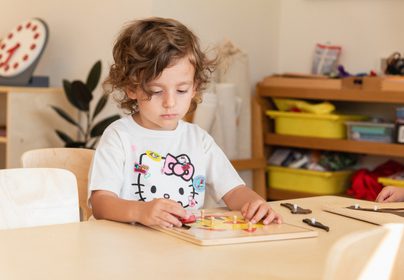An authentic Montessori school should embody the principles and methods developed by Dr. Maria Montessori, more than 100 years ago
Remember that the term “Montessori” is not trademarked, and some schools may use the label loosely without fully implementing authentic Montessori principles. Parents and guardians seeking a genuine Montessori education for their children should consider only accredited schools.
Accreditation for a Montessori school serves several important purposes and benefits, both for the school itself and for the families and students it serves.
Here's how you may distinguish a Montessori authentic school:
Montessori Accreditation
First, you search for a Montessori accreditation, a process that is done by a third party licensed to accredit and to ensure the authenticity, method, principles and teaching requirements are met.


Prepared Environment
Then look for the “prepared environment” which is a Montessori term for the carefully prepared classroom that caters to development needs of the children. A Montessori prepared environment should be inviting, simple, clean and neat. A Montessori classroom may not be fancy and colorful. Children should be able to focus on their “work” (another Montessori term for the learning process).
Mixed-age classes
In an authentic Montessori school you will be able to find mixed-age classrooms, typically spanning three years. This multi-age setting allows for peer learning, cooperation, and collaboration.
The focus of the school should be on the child as an individual. Teachers observe each child's interests, strengths, and challenges and tailor their approach to meet each child's needs.


Freedom within Limits
'Freedom within limits' is a Montessori term that means children should have the freedom to choose their work and activities within the guidelines of the prepared environment. The teacher sets limits and boundaries to ensure a respectful and harmonious classroom environment.
Montessori education emphasizes individualized learning. Teachers provide one-on-one guidance and lessons based on a child's readiness and interests.
There should be extended, uninterrupted work periods during the school day to allow children to engage in deep, focused learning without unnecessary disruptions.
Montessori classrooms should be equipped with a wide range of specialized learning materials that promote exploration, discovery, and learning through direct experience. Most authentic schools use Montessori materials which are produced by licensed manufacturers or materials that Montessori-certified teachers have produced for the children.
The school environment should be respectful, nurturing, and supportive. Teachers should model and encourage kindness, empathy, and mutual respect among the students.
A Montessori school should strive to develop the whole child—academically, socially, emotionally, and physically. The curriculum should include not only academic subjects but also art, music, cultural studies, and opportunities for physical movement.
The focus should be on intrinsic motivation rather than relying heavily on external rewards or punishments. The joy of learning and personal growth should be encouraged.
So, when you choose the Montessori school of your child, look for the following:
- Montessori Accredited School
- No fancy environment, but rather neat and clean, home-like
- Certified Montessori teachers
- Authentic Montessori-developed materials that are produced by licensed factories (some materials may be developed by the teachers)
- Last, but not least, look for the vibe and the feeling you get once you enter the Montessori School. Trust those parental instincts.
The International Montessori School of Albania (IMSA) has proudly offered an authentic Montessori education since 2007. IMSA is the only Montessori Accredited school in Albania, using authentic Montessori materials and delivering the programme with Montessori licensed teachers.



